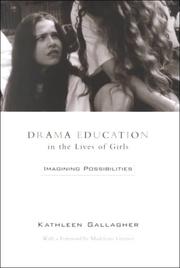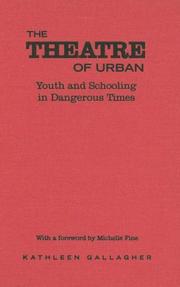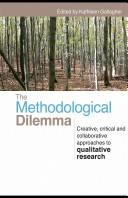| Listing 1 - 10 of 15 | << page >> |
Sort by
|
Book
ISBN: 9781138555143 9781138555112 1138555118 1138555142 9781315149325 9781351370820 Year: 2018 Publisher: Abingdon, Oxon New York, NY Routledge, an imprint of the Taylor & Francis Group
Abstract | Keywords | Export | Availability | Bookmark
 Loading...
Loading...Choose an application
- Reference Manager
- EndNote
- RefWorks (Direct export to RefWorks)
In The Methodological Dilemma Revisited, authors examine what in their research processes has given pause, thwarted the process of seamless productivity, or stalled the easy research output but has, instead, insisted upon a deeper analysis. This resistance of the expedient explanation has consequences both for the research topics under study and the ways in which qualitative research is conducted in a globalized era of deepening social inequality.The book is pedagogical in its orientation and reflects upon the politics of knowledge construction. Working with queer and minoritized youth communities, and other precarious publics, the authors convey their relationships to groups they are inside or outside of, or allied with—posing ethical questions about research designs and worldviews. Themes such as representation, refusal, and resistance of hegemonies are nuanced by investigations into the ethical, practical, and scholarly dimensions of the turn toward collaboration in qualitative inquiry. Other chapters examine the place, value, and concerns of aesthetic representation of qualitative research. Finally, the authors consider issues of criticality in research, and the concepts of compassion and humility.This book contains contributions from some of the most imaginative qualitative researchers, making the most of their research dilemmas in order to reflect upon the challenges and resistances they encounter in the work of qualitative research. (Provided by publisher)
Ethnology --- Qualitative research --- Methodology --- Social aspects --- #SBIB:303H30 --- Qualitative analysis (Research) --- Qualitative methods (Research) --- Research --- Qualitative ethnological research --- Kwalitatieve methoden: algemeen --- Ethnology - Qualitative research --- Qualitative research - Methodology --- Qualitative research - Social aspects

ISBN: 1281996122 9786611996123 1442674067 9781442674066 9781281996121 0802047637 9780802047632 0802084788 9780802084781 Year: 2001 Publisher: Toronto
Abstract | Keywords | Export | Availability | Bookmark
 Loading...
Loading...Choose an application
- Reference Manager
- EndNote
- RefWorks (Direct export to RefWorks)
"In this book, Kathleen Gallagher presents a case study that illustrates how drama provides a fertile ground for the intellectual and emotional development of girls. By examining the power and possibility of drama in schools to animate the processes of learning, Gallagher's research offers pedagogical alternatives in what she sees as an increasingly mechanistic and disempowering period in education. This work is a contribution to the fields of equity studies and the arts in education, as it provides a new lens through which to examine gender, diversity, and schooling."--Jacket
Drama --- Teenage girls --- Adolescent girls --- Female adolescents --- Girls --- Teenagers --- Drama, Modern --- Dramas --- Dramatic works --- Plays --- Playscripts --- Stage --- Literature --- Dialogue --- Study and teaching (Secondary) --- Education. --- Philosophy
Book
ISBN: 1442620587 9781442620582 9781442649576 1442649577 9781442626942 1442626941 1442620595 Year: 2014 Publisher: Toronto
Abstract | Keywords | Export | Availability | Bookmark
 Loading...
Loading...Choose an application
- Reference Manager
- EndNote
- RefWorks (Direct export to RefWorks)
What makes young people care about themselves, others, their communities, and their futures? In Why Theatre Matters, Kathleen Gallagher uses the drama classroom as a window into the daily challenges of marginalized youth in Toronto, Boston, Taipei, and Lucknow. An ethnographic study which mixes quantitative and qualitative methodology in an international multi-site project, Why Theatre Matters ties together the issues of urban and arts education through the lens of student engagement. Gallagher's research presents a framework for understanding student involvement at school in the context of students' families and communities, as well as changing social, political, and economic realities around the world. Taking the reader into the classroom through the voices of the students themselves, Gallagher illustrates how creative expression through theatre can act as a rehearsal space for real, material struggles and for democratic participation. Why Theatre Matters is an invigorating challenge to the myths that surround urban youth and an impressive study of theatre's transformative potential.
Drama in education --- Theater and society --- Arts in education --- Urban youth --- City dwellers --- Youth --- City children --- Education --- Actors --- Society and theater --- Theater --- Creative dramatics (Education) --- Theater in education --- Social conditions --- Social status --- Social aspects --- Case studies

ISBN: 1442683899 9781442683891 9780802092915 9780802094834 0802092918 080209483X 1442691735 Year: 2007 Publisher: Toronto
Abstract | Keywords | Export | Availability | Bookmark
 Loading...
Loading...Choose an application
- Reference Manager
- EndNote
- RefWorks (Direct export to RefWorks)
Because of its powerful socializing effects, the school has always been a site of cultural, political, and academic conflict. In an age where terms such as 'hard-to-teach,' and 'at-risk' beset our pedagogical discourses, where students have grown up in systems plagued by anti-immigrant, anti-welfare, 'zero-tolerance' rhetoric, how we frame and understand the dynamics of classrooms has serious ethical implications and powerful consequences.Using theatre and drama education as a special window into school life in four urban secondary schools in Toronto and New York City, The Theatre of Urban examines the ways in which these schools reflect the cultural and political shifts in big city North American schooling policies, politics, and practices of the early twenty-first century.The Theatre of Urban not only explores the very notion of performance in a novel and interesting way, it also provides new insights into the conflicts that often erupt in these highly charged school spaces.
EDUCATION --- General --- Theater --- Drama --- Urban high schools --- Music, Dance, Drama & Film --- High schools --- Urban schools --- Drama, Modern --- Dramas --- Dramatic works --- Plays --- Playscripts --- Stage --- Literature --- Dialogue --- Dramatics --- Histrionics --- Professional theater --- Theatre --- Performing arts --- Acting --- Actors --- Study and teaching (Secondary) --- Philosophy

ISBN: 9780415460613 9780415460620 9780203927175 Year: 2008 Publisher: London Routledge
Abstract | Keywords | Export | Availability | Bookmark
 Loading...
Loading...Choose an application
- Reference Manager
- EndNote
- RefWorks (Direct export to RefWorks)
Book
ISBN: 1442630817 9781442630819 9781442630796 1442630795 9781442630802 1442630809 1442630825 Year: 2016 Publisher: Toronto
Abstract | Keywords | Export | Availability | Bookmark
 Loading...
Loading...Choose an application
- Reference Manager
- EndNote
- RefWorks (Direct export to RefWorks)
"Why theatre now? Reflecting on the mix of challenges and opportunities that face theatre in communities that are necessarily becoming global in scope and technologically driven, In Defence of Theatre offers a range of passionate reflections on this important question. Kathleen Gallagher and Barry Freeman bring together nineteen playwrights, actors, directors, scholars, and educators who discuss the role that theatre can--and must--play in professional, community, and educational venues. Stepping back from their daily work, they offer scholarly research, artists' reflections, interviews, and creative texts that argue for theatre as a response to the political and cultural challenges emerging in the twenty-first century. Contributors address theatre's contribution to local and global politics of place, its power as an antidote to various modern social ailemnts, and its pursuit of equality. Of equal concern are the systematic and practical challenges that confront those involved in realizing theatre's full potential."--
Theater and society. --- Theater --- Aesthetics. --- Beautiful, The --- Beauty --- Esthetics --- Taste (Aesthetics) --- Philosophy --- Art --- Criticism --- Literature --- Proportion --- Symmetry --- Actors --- Society and theater --- Political aspects. --- Psychology --- Social status --- Social aspects --- Theater and society --- Aesthetics --- Théâtre et société --- Théâtre --- Esthétique --- Political aspects --- Aspect politique --- Radio broadcasting Aesthetics
Book
ISBN: 9780415835367 0415835364 Year: 2013 Publisher: London : Routledge,
Abstract | Keywords | Export | Availability | Bookmark
 Loading...
Loading...Choose an application
- Reference Manager
- EndNote
- RefWorks (Direct export to RefWorks)
City and town life in literature. --- City and town life in literature. --- Drama --- Drama. --- Drama. --- Gesellschaft. --- Jugendtheater. --- Kulturleben. --- Stadt. --- Theater and society. --- Theater and society. --- Theater. --- History and criticism.
Book
Abstract | Keywords | Export | Availability | Bookmark
 Loading...
Loading...Choose an application
- Reference Manager
- EndNote
- RefWorks (Direct export to RefWorks)
Book
ISBN: 9780307397249 Year: 2008 Publisher: Toronto Random House
Abstract | Keywords | Export | Availability | Bookmark
 Loading...
Loading...Choose an application
- Reference Manager
- EndNote
- RefWorks (Direct export to RefWorks)
Book
ISBN: 9811512825 9811512817 Year: 2020 Publisher: Singapore : Springer Nature Singapore : Imprint: Springer,
Abstract | Keywords | Export | Availability | Bookmark
 Loading...
Loading...Choose an application
- Reference Manager
- EndNote
- RefWorks (Direct export to RefWorks)
This book explores the affective and relational lives of young people in diverse urban spaces. By following the trajectories of diverse young people as they creatively work through multiple and unfolding global crises, it asks how arts-based methodologies might answer the question: How do we stand in relation to others, those nearby and those at great distances? The research draws on knowledges, research traditions, and artistic practices that span the Global North and Global South, including Athens (Greece), Coventry (England), Lucknow (India), Tainan (Taiwan), and Toronto (Canada) and curates a way of thinking about global research that departs from the comparative model and moves towards a new analytic model of thinking multiple research sites alongside one another as an approach to sustaining dialogue between local contexts and wider global concerns.
Education --- Politics and education --- Political aspects. --- Social groups. --- Family. --- Social sciences. --- Sociology—Research. --- Racism in the social sciences. --- Social service. --- Sociology of Family, Youth and Aging. --- Methodology of the Social Sciences. --- Research Methodology. --- Sociology of Racism. --- Social Work and Community Development. --- Benevolent institutions --- Philanthropy --- Relief stations (for the poor) --- Social service agencies --- Social welfare --- Social work --- Human services --- Social sciences --- Behavioral sciences --- Human sciences --- Sciences, Social --- Social science --- Social studies --- Civilization --- Family --- Families --- Family life --- Family relationships --- Family structure --- Relationships, Family --- Structure, Family --- Social institutions --- Birth order --- Domestic relations --- Home --- Households --- Kinship --- Marriage --- Matriarchy --- Parenthood --- Patriarchy --- Association --- Group dynamics --- Groups, Social --- Associations, institutions, etc. --- Social participation --- Social aspects --- Social conditions --- Sociology. --- Sociology --- Race. --- Community development. --- Sociological Methods. --- Race and Ethnicity Studies. --- Community development --- Regional development --- Economic assistance, Domestic --- Social planning --- Physical anthropology --- Social theory --- Methodology. --- Citizen participation --- Government policy
| Listing 1 - 10 of 15 | << page >> |
Sort by
|

 Search
Search Feedback
Feedback About UniCat
About UniCat  Help
Help News
News